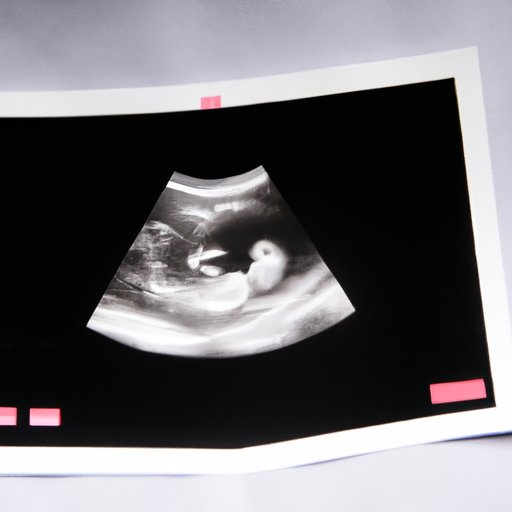
I. Introduction
For expectant parents, hearing their baby’s heartbeat for the first time is a special moment that marks the start of a new chapter in their lives. Ultrasound technology has made it possible to detect and hear fetal heartbeats earlier and with greater accuracy. However, many parents-to-be may be wondering when they can hear their baby’s heartbeat on ultrasound. In this article, we’ll explore the timeline for when fetal heartbeats can be detected, the science behind the sound, and what hearing the heartbeat means for your pregnancy.
II. The First Heartbeat: When Can You See and Hear Your Baby’s Heartbeat on Ultrasound?
Fetal heartbeats can usually be detected around 6-7 weeks gestation, though it can vary from one woman to another. The timing also depends on the type of ultrasound used. Transvaginal ultrasounds are more sensitive and can detect a heartbeat earlier than abdominal ultrasounds.
Hearing your baby’s heartbeat for the first time is an emotional experience for many expectant parents. It marks a crucial milestone in the pregnancy, and it provides reassurance that the baby is developing as it should. With the advances in ultrasound technology in recent years, hearing a heartbeat has become a routine part of prenatal care.
III. The Science Behind the Sound: How Ultrasound Detects Fetal Heartbeats
Ultrasound technology uses high-frequency sound waves to create an image of the fetus in the womb. To detect the fetal heartbeat, the ultrasound machine sends sound waves into the body, and as the sound waves bounce off the fetal heart, they create echoes that are picked up by the sensors in the machine. The echoes are then converted into an image and a sound that can be heard by the technician and the expectant parents.
Detecting a fetal heartbeat early in the pregnancy can be challenging. The embryo and the yolk sac can interfere with the sound waves and make it difficult to distinguish the fetal heartbeat. Furthermore, the position of the fetus in the womb can also play a role in the accuracy of the readings.
IV. What If You Can’t Hear the Heartbeat Yet? Understanding False Alarms and Next Steps
Not hearing a heartbeat during an early ultrasound can be alarming for expectant parents. However, there are several reasons why a heartbeat may not be detectable yet. For example, the gestational age might be too early, or the position of the fetus might be obstructing the view.
If a heartbeat cannot be detected, it’s important to remember that it doesn’t necessarily mean a problem with the pregnancy. Many women go on to have healthy pregnancies even when a heartbeat isn’t detected until later weeks.
V. The Evolution of Fetal Heart Rate: What to Expect as Your Baby Grows
As the fetus develops, the heart rate changes. The fetal heart rate can range from 100 to 160 beats per minute (bpm), and it usually increases as the fetus grows. Around 9-10 weeks gestation, the fetal heart rate stabilizes, and it becomes a reliable indicator of the baby’s health. Monitoring the fetal heart rate throughout the pregnancy is a crucial part of prenatal care.
With each passing week, the ultrasound readings become more accurate, and the heartbeat becomes easier to detect. By the time the mother reaches the second trimester, hearing the baby’s heartbeat is a routine part of every prenatal appointment.
VI. Hearing Your Baby’s Heart: What Does It Mean for Your Pregnancy?
Hearing your baby’s heartbeat is a significant moment for expectant parents. It provides reassurance that the pregnancy is progressing as expected and that the baby is developing healthily. It also marks the transition from the initial excitement and apprehension of finding out about the pregnancy to the more tangible experience of becoming a parent.
Overall, hearing your baby’s heartbeat on ultrasound is an emotional and meaningful experience that brings parents-to-be closer to the reality of their growing family.
Conclusion
Hearing your baby’s heartbeat on ultrasound is a significant milestone in pregnancy, and it’s one that many expectant parents look forward to with eagerness and excitement. While the timing of when a heartbeat can be detected can vary, advances in ultrasound technology have made it easier and more accurate to detect fetal heartbeats earlier in the pregnancy. The science behind the sound is fascinating, and understanding how it works can provide reassurance for parents who might be worried about not hearing a heartbeat. Overall, hearing your baby’s heartbeat is a momentous experience that marks the start of an exciting journey towards parenthood.





